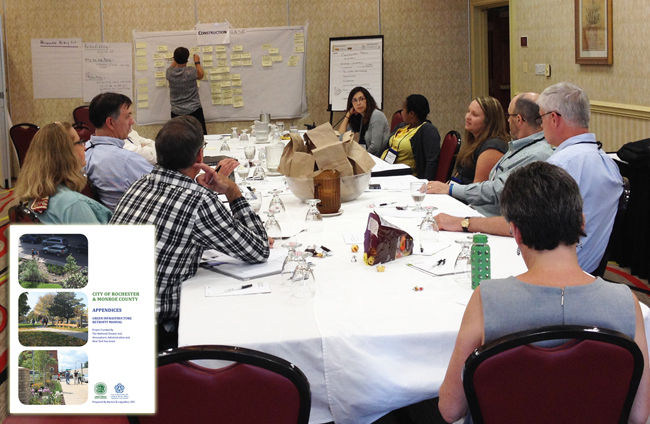
This work group session addressed construction elements at a Green Infrastructure Retrofit Manual development workshop in Rochester in 2017. Credit: NYSG/Mary Austerman.
Learn a Natural Systems Approach for Stormwater Management
Contacts:
Mary Austerman, NY Sea Grant, Great Lakes Coastal Community Specialist, P: 315-331-8415, E: SGNewark@cornell.edu
Kara Lynn Dunn, NYSG Great Lakes Publicist, P: 315.465.7578, E: karalynn@gisco.net
Batavia, N.Y., October 2, 2018 - Got stormwater? Got flooding?
Interested in reducing runoff that collects pollutants on its way to the Great Lakes or the water body nearest to your community? Ready to add natural elements to developed areas in your area to reduce nuisance flooding, improve streetscapes, enhance property values, and add to the quality of life in your community?
Learn how at the Green Infrastructure Retrofit Manual Training workshop, one of many educational opportunities at the 2018 Genesee/Finger Lakes Regional Planning Council Fall Local Government Conference, on November 14 at the Quality Inn and Suites in Batavia, N.Y.
Green infrastructure (GI) is a design strategy that applies a natural systems approach to managing stormwater and creating healthier, more sustainable environments.
“This workshop will use hands-on activities to help participants think through the aspects of GI and GI retrofit, including funding. The exercises will improve familiarity with the Green Infrastructure Retrofit Manual and empower participants to apply what they learn to benefit their communities,” said Mary Austerman, a Coastal Community Development Specialist with New York Sea Grant (NYSG), Newark, N.Y. “
Workshop presenters will include Austerman; Tashya Allen, Coastal Hazards Specialist, National Oceanic and Atmospheric Administration (NOAA), Charleston, S.C.; David Hanny, Senior Managing Environmental Scientist, and Thomas Robinson, Senior Managing Landscape Architect, Barton & Loguidice, D.P.C., Rochester, N.Y.
Participants in three-hour Green Infrastructure Retrofit Manual Training at the November 14 conference will receive a copy of the 189-page manual and its 109-page appendices resource developed by NYSG in partnership with the City of Rochester, Monroe County, NOAA, the Association of State Floodplain Managers, and Barton & Loguidice, D.P.C.
For most municipalities this workshop at the Local Government Conference fulfills state law requiring training for local planning officials. At the completion of the training, participants can request a Certificate of Participation from the Genesee/Finger Lakes Regional Planning Council for the number of hours of attendance. This training is eligible for 3 AICP CM credits and pending CFM and PDH/CEU credit approvals.
Although the Green Infrastructure Retrofit Manual was developed with input from localized stakeholders for the City of Rochester and Monroe County, the guidance in the manual is applicable to communities elsewhere. To register for the 2018 Genesee/Finger Lakes Regional Planning Council Fall Local Government Conference, contact David S. Zorn at the Genesee-Finger Lakes Regional Planning Council, Rochester, N.Y., 585-454-0190 x 14, dave.zorn@gflrpc.org.
Earlier this year, the Great Lakes Commission issued a report outlining steps to increase the adoption of green infrastructure in communities across the Great Lakes region.
More Info: New York Sea Grant
New York Sea Grant (NYSG), a cooperative program of Cornell University
and the State University of New York (SUNY), is one of 33 university-based
programs under the National Oceanic and Atmospheric Administration’s
National Sea Grant College Program.
Since 1971, NYSG has represented a statewide network of integrated
research, education and extension services promoting coastal community
economic vitality, environmental sustainability and citizen awareness
and understanding about the State’s marine and Great Lakes resources.
Through NYSG’s efforts, the combined talents of university scientists
and extension specialists help develop and transfer science-based
information to many coastal user groups—businesses and industries,
federal, state and local government decision-makers and agency managers,
educators, the media and the interested public.
The program maintains Great Lakes offices at Cornell University, SUNY
Buffalo, SUNY Oswego and the Wayne County Cooperative Extension office
in Newark. In the State's marine waters, NYSG has offices at Stony Brook
University in Long Island, Brooklyn College and Cornell Cooperative
Extension in NYC and Kingston in the Hudson Valley.
For updates on Sea Grant activities: www.nyseagrant.org has RSS, Facebook, Twitter, and YouTube links. NYSG offers a free e-list sign up via www.nyseagrant.org/nycoastlines for its flagship publication, NY Coastlines/Currents, which is published quarterly. Our program also produces an occasional e-newsletter,"NOAA Sea Grant's Social Media Review," via its blog, www.nyseagrant.org/blog.